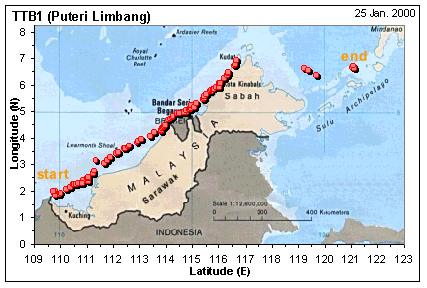Charting migration path of marine turtles Wong :Research will be successful Reports by Wilson Luke,
Frankie Lian Labang, Aden Nagrace, Sharon Ling, Christie Aili and Harun
Jau KUCHING - Environment and Public Health Minister Datuk Amar James Wong is confident the Talang-Satang Turtle Research Working Group would determine the feeding grounds and successfully chart the migration path of marine turtles tagged with satellite tracking device by end of February next year.
Launched this year, the
satellite transmitter called PTT (Platform Transmitter Terminal) is glued
to the dorsal carapace or shell of marine turtles when their nesting ends
on the beach. When the turtle is on the surface, above the water, the
exposed PT will send a burst of radio signal carrying information on the
identity of the transmitter and other sensor data. A second marine turtle named `Puteri Talang' by Datuk Law Hieng Ding who is Science, Technology and Environment Minister, was last detected at Pulau Banggi off the northern tip of Sabah. Another has been detected in the Celebes Island near Pulau Padjang in Indonesia (1,800 kilometres away from Pulau Satang) and is still there now. Datuk Amar Wong was pleased that 500 reef balls, positioned along the coast of Sarawak right up to the coast of Sabah in September last year, had prevented marine turtles from being caught and killed by trawlers furtively lurking in the open sea. The project, funded by the IRPA grant, is a collaborative effort of the Marine Wildlife Unit, Sarawak Forest Department, and the Sea Turtle Research Unit, Universiti Putra Malaysia Terengganu. The Minister appealed for
financial assistance from the private sector to ensure that the project
did not end there, as satellite batteries latched onto the marine turtles
were expected to run out in two months' time. He said the ministry was
also aiming to increase the number of reef balls to 10,000 from the
present 500. Each reef ball costs RM500. Other information gathered from this study, he said, would give the research group a better understanding of the biology, ecology and the effectiveness of efforts to conserve sea turtles in the region. According to Datuk Amar Wong, as a result of protection accorded by the reel balls positioned at Pulau Satang Besar, the research group found 226 nests this year compared to only 60 last year. Up to 1,000 nests found at
Pulau Talang Kecil are expected to increase to 1,40C by end of December
this year. To date, the number of nests stands at 1,300. He revealed that
this year, the number of turtle eggs laid had reached 120,00( from 100,000
last year).
|
